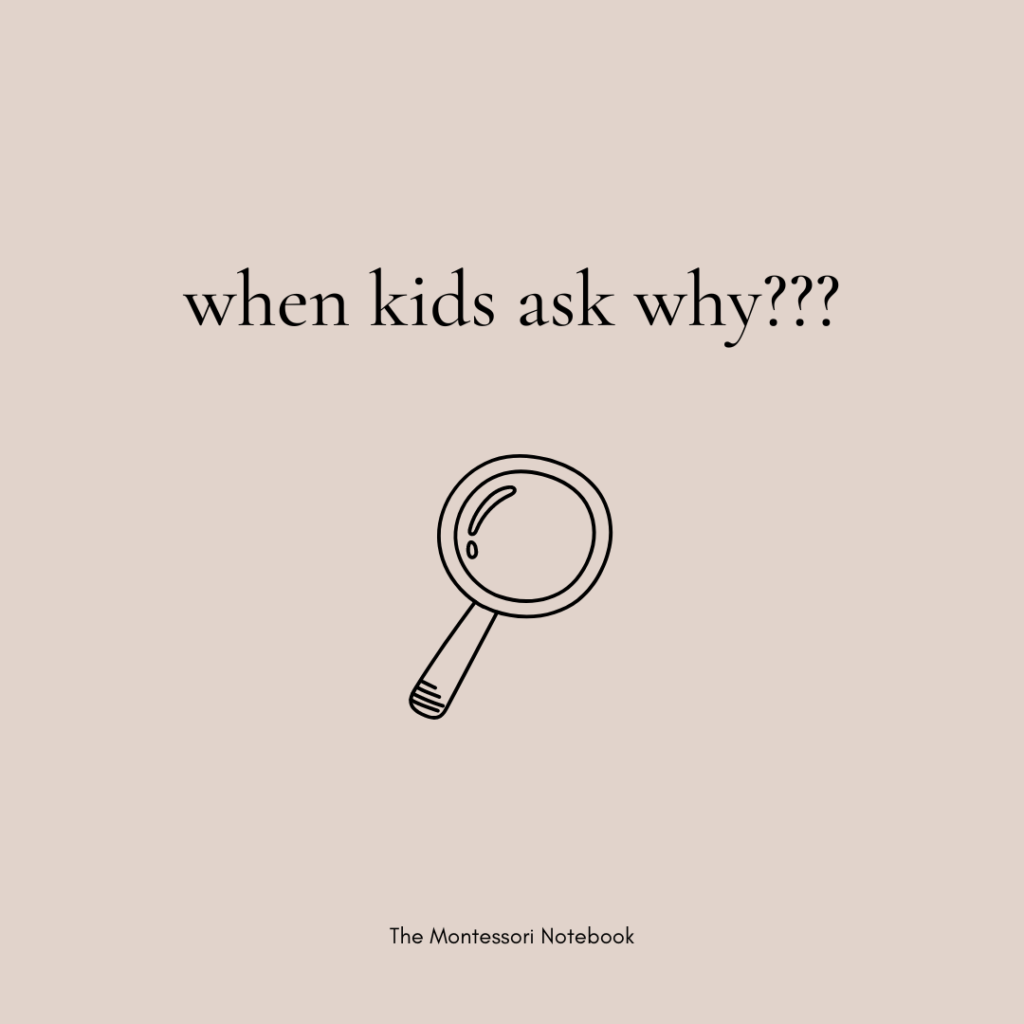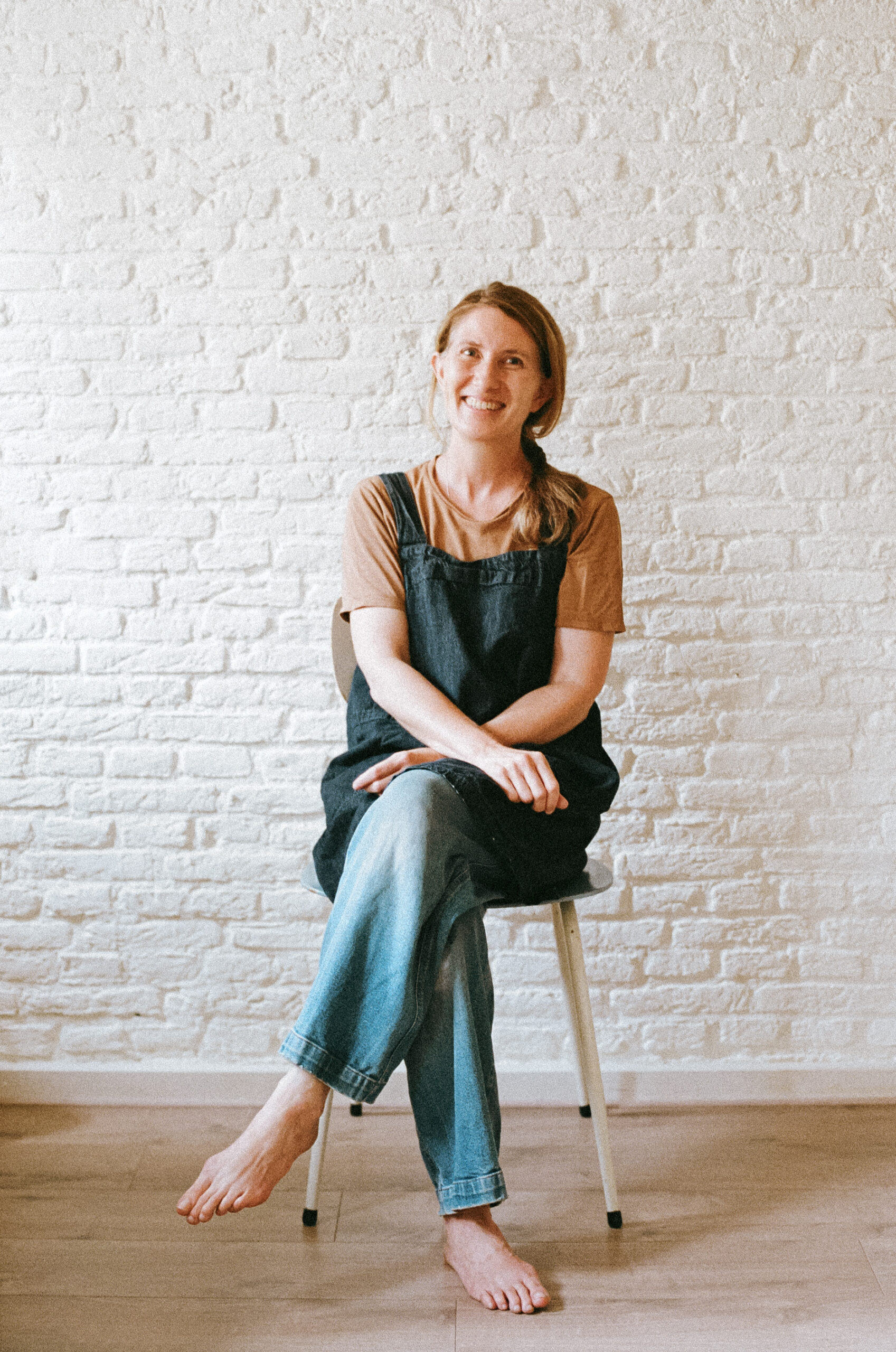What to do when kids ask “why?”
Are you at the stage of development when your child is asking constantly “why?’ Maybe even more common is “but why?” When kids ask “why?” it can be fun to start with but after the 15th question in a matter of minutes, it requires a saint to stay calm and not lose their mind.
I had a fun conversation about this stage with a parent in class and thought I’d share a few of the ideas with you.
Because I never want our children to stop asking questions. That is how they will find out about the world, become critical thinkers, and imagine possibilities that we have not even thought of.

Why do children ask “why?”
To answer this we’ll need a little bit of background. As you likely are aware, Dr Montessori observed that children from around 0 to 6 years (the first plane of development) have an absorbent mind. This first plane of development is divided into two sub-planes, 0-3 and 3-6.
From 0-3 years they have what Dr Montessori referred to as an unconscious absorbent mind, able to take in everything from their environment (the language spoken, the environment, our attitudes etc) without any cognitive effort or choice.
Around 2.5 or 3 years, they have a conscious absorbent mind, wanting to crystallise and understand everything they took in during that first sub-plane from 0-3 years. They become aware of what they are taking in. They are still absorbing everything, but now with a questioning and active mind.
So all of a sudden, we hear them say “What is that?” and “Why?” seeking a simple answer to something they previously absorbed.
[Click here for more on the four planes of development.]
How do we respond when kids ask why?
When our young child asks us “why?” most of us do our best to be patient and answer their question. The explanation can be short and direct. We can see what they already know and they may ask another question to clarify.
What’s an even better alternative?
To encourage their curiosity my favourite way to respond when kids ask why is to say, “I don’t know, let’s find out together.” Even if I do indeed know the answer to the question.
The beauty of this response is that they will be more engaged in finding out the answer to their question, we will involve their hands and senses as they seek to find out, and they are learning that when we don’t know something, they can find it out.
We could:
- look it up in a book
- go to the library to find out
- ask an expert or friend or someone who knows more about it
- design a hands on experiment to find out
- write in on a post it note to research later
One other fun idea is to use their question as a springboard for a conversation. If they ask why do birds fly, we could get into a very interesting conversation about wings, feathers, types of birds, other things that fly etc. The options are limitless.
What about if the questions go on and on and on or they ask us the same question?
If they continue to ask the same or endless questions, we can also turn the question around to them:
- “That’s a good question – why do you think?”
- “That’s right, we spoke about it earlier. Do you remember what we talked about?”
What about when a 6+ child asks why?
The child enters the second plane of development around 5.5/6 years old. Reason and the logic of things are paramount to the 6–12 child. They now show interest in not just the what and why but the how as well. We can’t just tell them something; there needs to be a reason, even if they don’t agree with it. As Dr. Montessori wrote, they want “to understand for [themselves], not content with accepting mere facts.”
Again we can invite the child to explore for themselves (or with us) to find out answers. They are starting to gain mental independence, ie, working on thinking for themselves, developing their own reasoning and their own judgment.
Want some other ways to keep our child thinking?
We can practice asking our own questions to keep our children curious. Try:
- “I wonder what would happen if . . . ?”
- “Can you guess what that is/does?”
- “I’m curious about ____ . Why do you think that’s the case?”
- or “Tell me more about that”
When reading a book together, we might ask:
- “What do you think the characters are thinking?”
- “What do you think might happen next?”
I hope you are starting to see that questions offer so many possibilities for learning and perhaps you’ll be inspired to use one of these alternatives rather than saying “because I said so!”

Simone Davies has more than 20 years’ experience as an AMI Montessori educator. Simone is the author of “The Montessori Toddler” and co-author of “The Montessori Baby” and “The Montessori Child” books, comprehensive guides to raising children in a Montessori way. She currently runs parent-child Montessori classes in Amsterdam at her school Jacaranda Tree Montessori. She also has a popular blog, instagram and podcast “The Montessori Notebook” and is mother to two young adults.